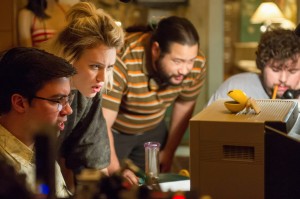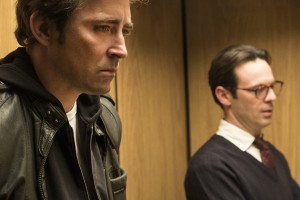
Mackenzie Davis as Cameron Howe and Cooper Andrews as Yo-Yo Engberk in HALT AND CATCH FIRE | © 2015 Richard DuCree/AMC
In AMC’s HALT AND CATCH FIRE, now in its second season Sundays at 10 PM, we’re in the middle of the Eighties and the technological revolution is in full swing. In the first season of the show created by Christopher Cantwell and Christopher C. Rogers, it’s 1982. Lee Pace’s character, self-destructive marketing genius Joe MacMillan swoops into the small Texas firm of Cardiff Electric and forces the company to compete with IBM in developing a PC. By the end of the season, Joe’s sometimes ally/sometimes victim, computer engineer Gordon Clark (Scoot McNairy), was running Cardiff’s development department and Gordon’s wife Donna (Kerry Bishe), also a computer engineer, had gone to work with tech whiz Cameron Howe (Mackenzie Davis), Joe’s sometime girlfriend, at the new gaming company Mutiny. Joe literally went into the mountains.
In Season 2, it’s 1985 and everyone is dealing with a whole new set of challenges on both the personal and technological fronts.
HALT’s executive producer/show runner Jonathan Lisco sits down to talk about what’s going on with his people, their emotions and their tech.
AX: How did you wind up as show runner on HALT AND CATCH FIRE?
JONATHAN LISCO: I want to give a big shout-out to the creators, Chris Cantwell and Christopher C. Rogers. Those guys are fantastic and they created this world from scratch and wrote the first episode before I ever signed on. I was contacted afterward by AMC, when they realized that they needed a show-runner with some experience, and I was coming off a show called SOUTHLAND, which was very different.
AX: SOUTHLAND was one of the best shows ever about the LAPD …
LISCO: Thank you. I think there’s actually a comparison between that show and this show. Because, especially with cop shows, if you’re going to tell a cop story in this day and age, and you’re going to make that the A story, a lot of people are going to lose interest fairly fast. We’ve seen a lot of that. So I always would tell the writers, “The A story in SOUTHLAND is not the cop story. It’s our characters’ reactions to and feelings about what’s happened in the cop story.”
Similarly, this show doesn’t live on the bits and bytes. We’ve got to get it right and we’ve got to make it credible, but if that’s really what’s going to carry the freight of the show, I think we’re going to fail. Therefore, we’re making the technology a spine of the show, but the technology is only interesting if it attaches to Gordon’s love of what of he’s doing or need for approval or desire not to be alone. Or Donna’s need to prove herself, or Cameron’s searching for connectivity. It only matters if it’s hooked into the psychopathology and the emotional stuff with our characters. So I think that’s how they’re similar, and that’s how I got involved, when I really realized and met the guys who created it, and they were on board with that idea. Because they [could have] said, “No, no, we want to make a show about an IBM PC. That’s what the show’s about.” And then I probably wouldn’t have signed on, but the fact that they said, “We agree, that’s what we want to do,” and AMC was behind us, it was a great privilege for me to come on board.
AX: At the time that the end of Season 1 was crafted, did you know that there was going to be a Season 2?
LISCO: No. For better or worse, with great respect to our network partners, it’s not AMC’s way, generally speaking, unless you’re a huge, out-of-the-box hit. In fact, over the summer, for many months, we still didn’t really know if we were renewed. And Chris [Cantwell], Chris [Rogers] and I had to continue conversations with the network, tell them some of the things we had planned, some of the things we wanted to do with the characters, just keep the dialogue going while they worked out their process of whether to renew the show.
AX: Did you have any interest in the Eighties era of technology at all before you became involved with HALT AND CATCH FIRE?
LISCO: Yes. I would classify myself as a guy who’s above-average interested in the Information Age and what we’re doing, but not somebody who is driven obsessively by it. I was around in the Eighties, [but] I wasn’t the guy staying up all night taking the [computer] box apart. I’m approaching it more from a dramatist’s point of view and, thank Heavens, we have really great technical consultants working on the show who can help us with that stuff. That said, I do have to, like all the other writers, wrap my mind around it in a way where I can look Kerry and Scoot in the eye and say, “This is real and you guys are really saying this.” Otherwise, I will feel bad. Because I don’t want them faking that stuff, and I know they do a lot of homework themselves to make that stuff come out of their mouths in a really credible way.
AX: How does contemporary technology affect the way you do the show?

Lee Pace as Joe MacMillan and Scoot McNairy as Gordon Clark in HALT AND CATCH FIRE | © 2015 Tina Rowden/AMC
LISCO: I sometimes look back and I think, “How did anybody ever make TV back before you could just share video on the Internet? How did that even happen?” And I do remember it, because when I was working on NYPD BLUE, every day, a guy, a human, used to deliver VHS cassettes to my house for dailies. And then a few years later, it was DVDs. And then suddenly, you don’t do that any more. It’s absurd to do that.
AX: Apart from being able to watch streaming dailies, is there anything specific that’s an issue with using current technology to depict older technology?
LISCO: Let’s say we want to do some CGI in the show. And let’s say we want the CGI to appear on the screen that our characters are looking at in 1985. Well, the CGI is so good now that you’ve actually got to dumb it down, you’ve got to mess it up, and sometimes you get the technicians on the other side of that in our VFX house and they don’t really know how. They were born in 1992. The whole idea of green screen is almost too good, because it didn’t exist. It makes the environments look too good.
AX: Scoot McNairy and Kerry Bishe had previously played a married couple in the movie ARGO. Do you know if they were cast as the married Gordon and Donna based on that earlier pairing?
LISCO: I actually don’t know, because when real conversations with their casting were taking place, AMC was still in negotiations with me about whether or not to run the show. I would venture to say “no.” That is my guess. They’re just such great actors, I think it was serendipity that they wound up being in the show together.
AX: Are we going to see Cameron and Donna dealing with the fact that they are two women in powerful places when in the tech world of 1985, there weren’t that many women at all in powerful places?
LISCO: “Yes” is the answer. However, it’s going to be different from what you might expect. These are two formidable women who do not think of themselves as female engineers. They think of themselves as engineers. So that in itself might seem out of the box, certainly from the point of view of the time period. But when they meet chauvinism and prejudice like that, I don’t think they’re going to go, “Oh, my gosh, can you believe this guy?” They’re going to do the cosmic shrug and say, “Well, sure, there are idiots like that in the world, of course there are,” and they’re really not going to give it much of a second thought, because they’re vectoring through space, doing what they want to do, not necessarily thinking twenty-four-seven about the fact that, excuse my French, they have v****as. I don’t think that’s really what’s important.
AX: Cameron sees herself as a separate individual from everybody around her, but Donna has at least externally taken on the wife and mother role and she’s not entirely happy about it when we meet her, but she is living with that expectation. By 1985, how does she feel about it?
LISCO: I see Cameron and Donna as two very different types of feminists. In some ways, Donna led the charge for a woman like Cameron, but Cameron may not appreciate it at the same level that she ought to. For Donna, she was told that she could have a family, have it all, and work. But what she really got was double the work. Cameron, not so much. She’s more of a free agent because of women like Donna, who came before. So I think, although they can make wonderful collaborators and good friends, I think in some ways there’s a tiny bit of resentment coming from Donna toward Cameron on that score, and a bit of obliviousness running from Cameron to Donna on that one.
AX: Donna and Cameron are working together, Donna and Gordon are still married – did you think, how do we get Joe off that mountain and back into some kind of interaction with the other characters?
LISCO: Oh, absolutely. That’s always a problem, because you’ve got to cross-pollinate these characters and bounce them off each other to create the drama. On the other hand, I just want to say, you really want to play fair with the audience. Cameron and Joe don’t like each other, or I should say, Cameron does not like Joe. Joe’s feelings are perhaps a little more complex. But to have them tumbling back into bed together at the beginning of Season 2 is not organic and not real between these two people, and you will not see that happening. So there’s going to be some work to do before those two come back into each other’s lives.
AX: Given the way he left, why does Joe come back?
LISCO: The tension for Joe I think is going to have a lot to do with redemption this season. And it’s literal and it’s figurative. He’s coming down off the mount and I think looking for redemption. I think deep down, Joe hates the fact that some characters, particularly Cameron, view him as this venal, Machiavellian shark. That really digs at him, and it could be because he hates to hurt people or it could be because he’s so egotistical that he doesn’t want people to think that way. And so, in seeking redemption, is there a new, authentic self that could spring from the ashes of what Joe did last season? Is that another mask that he’s trying on, or is there a real, authentic guy under there that we’re going to see this season? And that’s a question that I would love you to judge for yourself as you start to watch Season 2.
AX: Do you feel part of your job is writing characters who are meaningful to the audience?
LISCO: I was on a plane and I was working for NYPD BLUE and I was working on a script for NYPD BLUE, and the stewardess came over and said, “Do you work on NYPD BLUE?” And I wasn’t really attuned to how deeply people felt about characters who were fictional at that time. I said, “Yes.” And she said, “The only time I ever saw my husband cry was when Jimmy Smits died on that show, in twenty-six years of marriage.” And that’s when I knew that there was a sort of moral component to what we do. Not to sound too grandiose, but that it can actually affect people.
AX: What would you most like people to know about HALT AND CATCH FIRE going into Season 2?
LISCO: I’d like them to know that this show is not just for computer engineers or people who are interested in the technology. That stuff has appeal to some people and less appeal to others. But the infinity of human beings and their complexity, I think, doesn’t really lose interest for most people who like TV, because that’s what the show’s about. So if you’re interested in drilling deep on character, then you’ll like the show regardless of whether or not you’re into the technology.
This interview was conducted during AMC’s press day for the Television Critics Association at the Langham-Huntington Hotel in Pasadena, CA.
Follow us on Twitter at ASSIGNMENT X
Like us on Facebook at ASSIGNMENT X
Article Source: Assignment X
Article: HALT AND CATCH FIRE’s Jonathan Lisco gives the scoop on Season 2 – exclusive interview
Related Posts:











